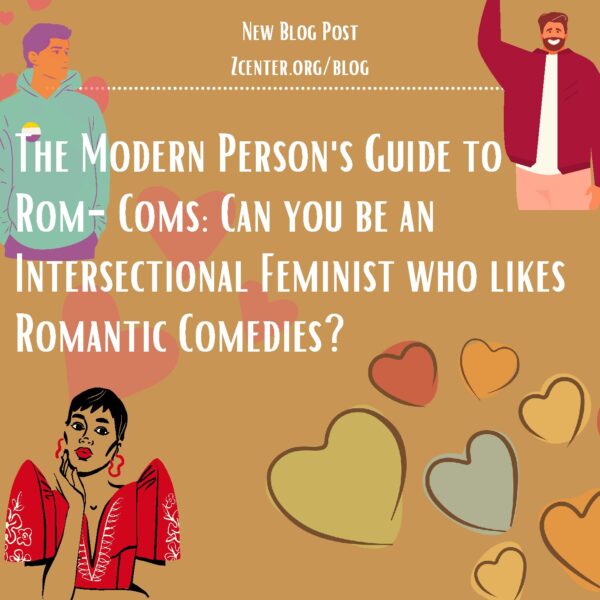You may have heard the theory: If you think of a red car, you will start seeing red cars everywhere. Well, that is actually a psychological theory. It is called the Baader Meinhof Theory, and it has to do with frequency bias. This means that the minute you learn or think of something, your brain will start zeroing in on that specific thing. So, if you think of red cars, all the red cars that your brain that were blocked out originally, will now become the first thing that your brain picks up on.
Now, what does this have to do with feminism and romantic comedies? My response to you is everything. How can you exist in the world when you finally become aware of all the problems and faults? This is a big question, so in today’s article, we are just keeping it to enjoying romantic comedies as an intersectional feminist. Can you, as a person who believes in gender equality, watch the societally proclaimed “chick flicks” that most times do not accurately represent the world? I doubt I will come to an answer in this blog, but there is some point in trying.
Let’s start with the statistics and facts so we know what we are up against. Romantic comedies tend to be extremely heterosexual. They often depict a man and a woman who adhere to the traditional roles of the gender binary. What this means is that gender non-conforming and queer people do not get to see themselves on the screen, or in love, or being a whole complete character. For example, GLAAD (the largest media advocacy organization for LGBTQ+ individuals) released a report that stated of the 118 movies that were released by what is deemed one of the major movie studios (think Universal Pictures, Paramount Pictures, Warner Bros. Pictures, Walt Disney Pictures and Columbia Pictures), only 18.6% of those movies had characters that identified as Queer. Now this includes all movies from all genres. Therefore, we can only assume how slim this percentage is in the romantic comedies section. As well, Queer folks in movies and media are still what society deems as conventionally attractive. They have clear skin, slim bodies, look high fashion, and most importantly many of these characters are White, which in effect, erases Queer People of Color.
Our next, but equally as important problem, is that romantic comedies often have White men and women as the stars of the show. People of Color love too and they deserve to grow up seeing themselves on the screen that shows that love story. Movies like Love and Basketball, Tortilla Soup, Always Be My Maybe, Bend It Like Beckham, The Last Holiday, Queen and Slim, Malcolm and Marie, and so many more are movies that changed the genre of romantic comedies and yet we still only have a romantic comedy featuring People of Color every few years. It is very rare that People of Color are accurately portrayed in these movies because the people behind the cameras tend to be White people.
Overall, story lines tell us that the only people who are worthy of having a romantic love like what we see in these movies are people who are White, Upper Class, Attractive, Skinny, and Straight, which pretty much erases a majority of the population.
So, why do we keep doing it to ourselves? Why do we tear up when Julia Roberts stands in front of Hugh Grant and says “I am just a girl standing in front of a boy asking him to love her.” Why do we cheer when the cold, calculating businesswoman falls in love with the dog walker (nothing wrong with being a dog walker, they just always seem to be the main male character’s occupation). Finally, why do we root for a love that doesn’t actually represent us? Because the idea of love and being in love is something that is so universal that we seem willing to take it any way we can. So how can we, as modern, intersectional feminists, continue to watch romantic comedies while also being aware of all that they are?
I love romantic comedies. It shocks a lot of people when I say this because I may not seem like the “chick flick type” but I do. In a world that is very unpredictable, the predictable world of romantic comedies soothes me. Or at least it used to. The more and more that I continue to learn about the world, the less I am able to enjoy things, albeit many things: music, movies, art, or anything. But as a product of the world, how do we take the good with the bad? The first step would be to continue to educate ourselves, so that we better understand the stereotypes in movies and how they harm us and the people we surround ourselves with. It is important to make sure we are continually addressing our own internal bias towards certain groups and recognize that the stereotypes in the film do not encompass all that a group of people are. As well, in a world that is constantly evolving we, ourselves must evolve as well. That means that we start to boycott movies that we just cannot stand for. For example, those movies that were directed by Woody Allen, produced by Harvey Weinstein, or acted in by Kevin Spacey.
Like many things, it is our duty and job to help shift the culture so that it is more inclusive and more representative of the world that we are living in. So yes, as a modern, intersectional feminist you can enjoy romantic comedies, but you also have to be critical of them. Make sure that you are actively working to counteract the misogyny of many of these movies.
As Noah expresses in the Notebook, “So it’s not gonna be easy. It’s gonna be really hard. We’re gonna have to work at this every day, but I want to do that because I want you. I want all of you, forever, you and me, every day.” This is how I feel about romantic comedies as a feminist.
Written by Cassidy Herberth (She/they), Education and Prevention Specialist.
All ZCenter blog posts are written by state certified staff, interns, and volunteers. For questions on authorship or content, please email kjones@zcenter.org.
“GLAAD’S 2020 STUDIO RESPONSIBILITY INDEX: HIGHEST RECORDED PERCENTAGE OF LGBTQ-INCLUSIVE FILMS BUT RACIAL DIVERSITY DROPS AND ZERO TRANSGENDER CHARACTERS APPEAR”. GLAAD, 2020, https://www.glaad.org/releases/glaad%E2%80%99s-2020-studio-responsibility-index-highest-recorded-percentage-lgbtq-inclusive-films.
Guzzo, Bianca. “The Modern Girl And Romantic Comedies”. 29Secrets, 2019, https://29secrets.com/pop-culture/the-modern-girl-and-romantic-comedies/.
Klooster, Grace. “How Modern Day Romantic Comedies Are Portraying Women”. Ncclinked, 2017, https://ncclinked.com/2017/09/15/modern-day-romantic-comedies/.
Rose, Sundi. “A Feminist’S Guide To Modern Rom-Coms”. Culturess, 2019, https://culturess.com/2019/05/28/feminist-guide-to-modern-rom-coms/.

